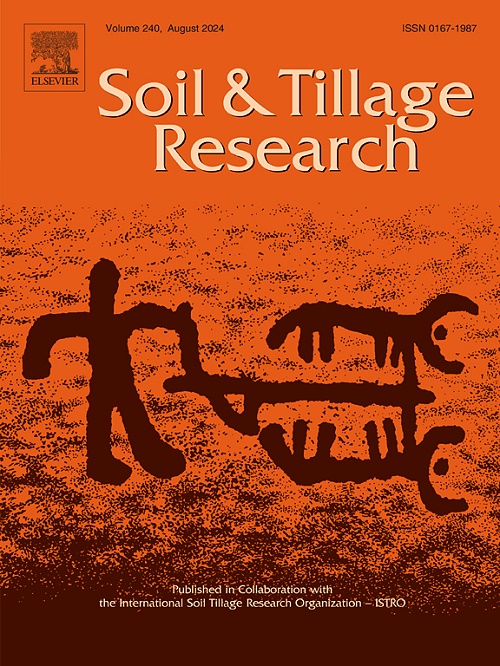Straw incorporating in shallow soil layer improves field productivity by impacting soil hydrothermal conditions and maize reproductive allocation in semiarid east African Plateau
IF 6.1
1区 农林科学
Q1 SOIL SCIENCE
引用次数: 0
Abstract
Ridge-furrow plastic film mulching (RFM) planting system can conserve soil water and boost crop yield in semi-arid rainfed agricultural areas. In the east African Plateau (EAP), the RFM system has shown significant promoting effects on the yield and water use efficiency in maize (Zea mays L.) and wheat (Triticum aestivum L.). Although the RFM system is effective and efficient, it is unclear how to further increase crop productivity under RFM in EAP where soil moisture is limited. This study advocates for an integrated practice (maize straw returning) in the RFM system. Field trials were conducted using maize cultivar DK8031 to investigate the effects of maize straw returning in the shallow soil layer on soil hydrothermal conditions from 2021 to 2022. Maize productivity, water use efficiency, soil organic carbon, and soil total nitrogen were determined under RFM in Kenya, EAP. Three treatments were designed as follows: 1) conventional bare flat planting, CK; 2) RF with full plastic film mulching, RFM; and 3) RFM with maize straw piece (9 t ha−1) returning to 0–30 cm soil layer, RFMR. The results indicated that soil water storage (SWS) was substantially improved by 40.8 mm in 2021 and 30.9 mm in 2022 in RFMR, respectively, than that of CK, which was also significantly greater than that of RFM (p<0.05). Under relatively high air temperature at the silking stage, soil temperature at 15 cm soil depth was averagely reduced by 0.85 °C in RFMR and 0.15 °C in RFM, respectively, compared with CK. Across two growing seasons, grain yield and water use efficiency increased by 470 kg ha−1 and 1.5 kg ha−1mm−1 in RFMR compared to RFM and 2407 kg ha−1 and 7.1 kg ha−1mm−1 compared with CK, respectively., The highest economic benefit was found in RMFR, relative to RFM and CK. The above trend was positively associated with the improvements in hydrothermal conditions in the shallow soil layer. Additionally, soil organic carbon was increased by 0.88 g kg−1 in RFMR relative to CK due to improved soil structure and physiochemical traits. For the first time, we found that straw pieces returning to the shallow soil layer can further boost maize productivity on the basis of RFM, which was intended to improve soil texture in EAP.
将秸秆掺入浅土层可影响半干旱东非高原的土壤水热条件和玉米生殖分配,从而提高田间生产力
脊-沟塑料薄膜覆盖(RFM)种植系统可以在半干旱雨水灌溉农业地区保持土壤水分并提高作物产量。在东非高原(EAP),RFM 系统对玉米(Zea mays L.)和小麦(Triticum aestivum L.)的产量和水分利用效率有显著的促进作用。虽然 RFM 系统效果显著、效率高,但在土壤水分有限的东亚和太平洋地区,如何在 RFM 系统下进一步提高作物产量尚不清楚。本研究提倡在 RFM 系统中采用综合做法(玉米秸秆还田)。在 2021 年至 2022 年期间,使用玉米栽培品种 DK8031 进行了田间试验,研究浅土层玉米秸秆还田对土壤水热条件的影响。测定了肯尼亚东亚农业区 RFM 下的玉米生产力、水分利用效率、土壤有机碳和土壤全氮。设计了以下三个处理:1)常规裸地种植,CK;2)全塑料薄膜覆盖的 RF,RFM;3)玉米秸秆片(9 吨/公顷-1)覆盖 0-30 厘米土层的 RFM,RFMR。结果表明,RFMR 在 2021 年和 2022 年的土壤蓄水量(SWS)分别比 CK 显著提高了 40.8 毫米和 30.9 毫米(p<0.05)。在吐丝期气温相对较高的情况下,RFMR 和 RFM 15 厘米土层深度的土壤温度分别比 CK 平均降低了 0.85 °C和 0.15 °C。在两个生长季中,与 RFM 相比,RFMR 的谷物产量和水分利用效率分别增加了 470 千克/公顷和 1.5 千克/公顷-1 毫米-1;与 CK 相比,RFMR 的谷物产量和水分利用效率分别增加了 2407 千克/公顷和 7.1 千克/公顷-1 毫米-1。上述趋势与浅土层水热条件的改善呈正相关。此外,由于土壤结构和理化性状的改善,相对于 CK,RFMR 的土壤有机碳增加了 0.88 g kg-1。我们首次发现,在 RFM 的基础上,秸秆碎片回归浅土层可进一步提高玉米产量,从而改善 EAP 的土壤质地。
本文章由计算机程序翻译,如有差异,请以英文原文为准。
求助全文
约1分钟内获得全文
求助全文
来源期刊

Soil & Tillage Research
农林科学-土壤科学
CiteScore
13.00
自引率
6.20%
发文量
266
审稿时长
5 months
期刊介绍:
Soil & Tillage Research examines the physical, chemical and biological changes in the soil caused by tillage and field traffic. Manuscripts will be considered on aspects of soil science, physics, technology, mechanization and applied engineering for a sustainable balance among productivity, environmental quality and profitability. The following are examples of suitable topics within the scope of the journal of Soil and Tillage Research:
The agricultural and biosystems engineering associated with tillage (including no-tillage, reduced-tillage and direct drilling), irrigation and drainage, crops and crop rotations, fertilization, rehabilitation of mine spoils and processes used to modify soils. Soil change effects on establishment and yield of crops, growth of plants and roots, structure and erosion of soil, cycling of carbon and nutrients, greenhouse gas emissions, leaching, runoff and other processes that affect environmental quality. Characterization or modeling of tillage and field traffic responses, soil, climate, or topographic effects, soil deformation processes, tillage tools, traction devices, energy requirements, economics, surface and subsurface water quality effects, tillage effects on weed, pest and disease control, and their interactions.
 求助内容:
求助内容: 应助结果提醒方式:
应助结果提醒方式:


